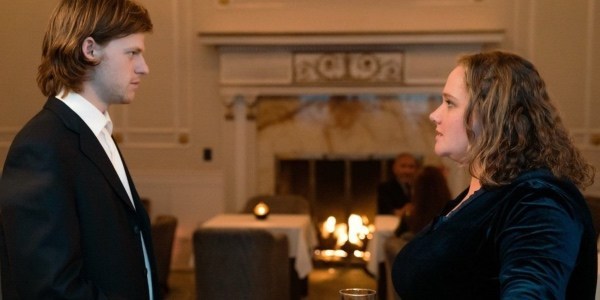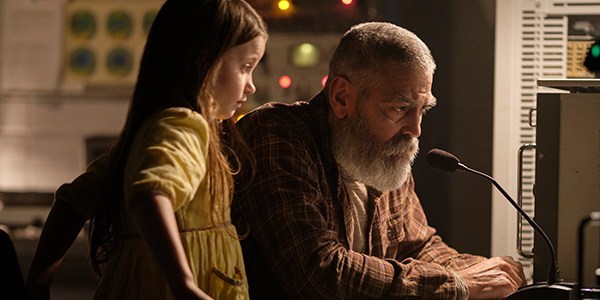NYFF 2020: FRENCH EXIT
French Exit, from director Azazel Jacobs, is a film I shouldn’t like, yet can’t resist. There’s a quirky awkwardness interwoven throughout the film’s premise and character interactions that lends itself to a strange, unique narrative. The appeal to separate one’s self mirrors the high-class society that has turned its back on the fallen family, whose devastation became the talk of the town. Adapted from the novel of the same name from author Patrick DeWitt, who also pens the film’s screenplay, French Exit is one of the most distinctive films of the year, delivering witty dialogue, nuanced performances, and a resounding depiction of acceptance and control.
The Exit
Eccentric socialite Frances Price (Michelle Pfeiffer) has been evading the truth that the inheritance she has flaunted to others and to her son is coming to an end. Hoping to have been dead before the money runs out, she is forced to face a future without the livelihood to which she is accustomed to, robbing her of any control of the world around her. As she sells her home, her paintings, and her various possessions, a close friend offers her apartment in Paris to Frances and her son, giving a place where they can get a fresh start from the society life of New York. Hesitant at first, she accepts the offer, unknowingly threatening the relationship her son has with his girlfriend and making a decision that will give her the control she so desperately needs. A comedy of manners ensues.
As they cross the Atlantic to the new life that awaits them, they are greeted by a clairvoyant, briefly cracking open the doors to welcome others into their lives. As they adjust to life in Paris, Frances spending the remaining sum of her inheritance, though the money doesn’t become the film’s focus, but rather the deeply rooted relationship between mother and son (which starts off as a mama’s boy framework, breaking down into a deeply layered bond of trust and likeness) and the expansion of experience of letting others into one’s life.
Crafting the Exit
The film will have you scratching your head, not necessarily for what is happening, but for where the film is going. Depression, unpredictability, and pure loyalty are wild cards, lending not to predictability but rather uncertainty. Moments like maniacal laughing while sharpening knives and quiet, unfilled silences, among others, are off-kilter, yet intriguing. Because of this, French Exit allows itself to breathe some of the most memorable scenes of the year, both in serious drama and in comedy. As mentioned, the maniacal laughing of Pfeiffer sharpening a knife and throwing it across the room gives a glimpse into the breakdown of a woman struggling to accept her present state and her unassured future, tearing down the strength she exhibits to others. There is a glimpse of depression and relinquishment of control. It is a scene that contrasts itself brilliantly, as she’s a shallow and callus woman on the surface. Most importantly, though, it is only on the surface.

The film keeps upbeat and comical even in the face of its subject matter. A scene I find myself quoting (“Look in the freezer”) speaks not only to the relationship between Frances and Malcolm – their shared humor, understanding, and unity – but also gives a moment for the film to show growth in its characters, a comical scene with deep underlays of garnering control, gaining respect and learning the power of vulnerability. While the funniest moment in the film, it might be the film’s most pivotal.
While the emotions heighten French Exit, the technicality with which they are captured certainly helps. The film excels in its editing, giving time for a scene to unfold and fill the screen, yet moving along to maintain interest and intrigue. The framing of these scenes and interactions is brilliant, with many characters walking into the frame, changing the focal point, and characters taking control of the camera, and your attention. One of the best examples goes back to the “Look in the freezer” scene, with wide shots taking in the room and the characters, and close-ups framed as different characters take control of the narrative.
The True Success of French Exit
There is a French saying, “Marcher ave un ami dans le noir est mieux que de marcher seul dans la lumière,” which means, “Walking with a friend in the dark is better than walking alone in the night.” When French Exit concluded, I found myself obsessed with the acting from the cast, and with the characters themselves. This film’s success is securely fastened to its cast and its revolving menagerie of characters. And what a menagerie it is. An awkward chemistry exists between characters that match the quirky story at hand. They are as unique as their tale, and each nuance they deliver is a gem you take in and treasure.
Michelle Pfeiffer delivers an edgy and eccentric depiction of a socialite coming to terms with her future, resolute on controlling what is to come. You feel the love and devotion she has for her son, yet you can feel the battling nature within her. There is a facade she exhibits, the contrasted layers of self brilliantly displayed by Pfeiffer. Lucas Hedges matches her wit and skill, maintaining the chemistry between them, layering his performance to match her excellence. His portrayal of Malcolm has an initial facade as well, though you realize he’s just a young man who truly loves the company of his mother and the unique bond that they share. Both Pfeiffer and Hedges work well together and off one another, giving further depth to each of their characters when interacting, with their unity in performance clearly readable in the unity between their characters. They truly are the heart of this film.
French Exit is rounded out by the eclectic band of characters that one by one is pulled into the lives of the film’s main characters. Valerie Mahaffey as Madame Reynard brings the eager “fangirl” aspect all while softening the film and its interactions. Danielle MacDonald is the more straightforward American clairvoyant who is given the ability to see the truth, to see beneath the facade, providing channels for the truth to rise to the surface. Isaach De Bankolé gives a quiet performance as the investigator hired to find the clairvoyant, his observant and silent nature lending him to not only see the kindness in others but to embrace it, while his curiosity and onlooker moments reflect the audience. Susan Coyne portrays the supporting nature of Joan, showing love, devotion, and care for her friend that remains unaltered regardless of riches. Imogen Poots‘ Susan is the indomitable force that holds onto us even when unseen, pushing us forward, pushing decisions and commitments to be made. A vast cast circling our central characters, yet a group of actors that remain strong, resilient, nuanced, and unforgettable.
Conclusion: French Exit
French Exit is a unique film, one that many will likely not allow to shine, yet a story that should be embraced. Its quirky and awkward characters, its absurd interactions, and its overall journey is eclectic and eccentric. While the film’s two leads dazzle, their chemistry undeniable, this is a film about the human connection, deeply rooting its supporting cast in a journey that is not bound by sea or land, but rather the understanding of the journey.
French Exit screened at the New York Film Festival. It is scheduled to be released on February 12, 2021.
Watch French Exit
Does content like this matter to you?
Become a Member and support film journalism. Unlock access to all of Film Inquiry`s great articles. Join a community of like-minded readers who are passionate about cinema – get access to our private members Network, give back to independent filmmakers, and more.
Join now!





